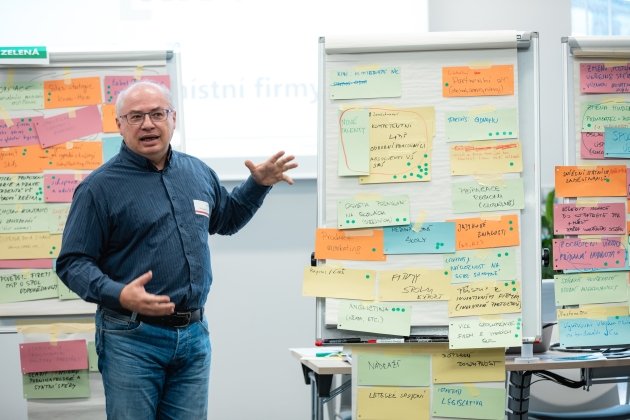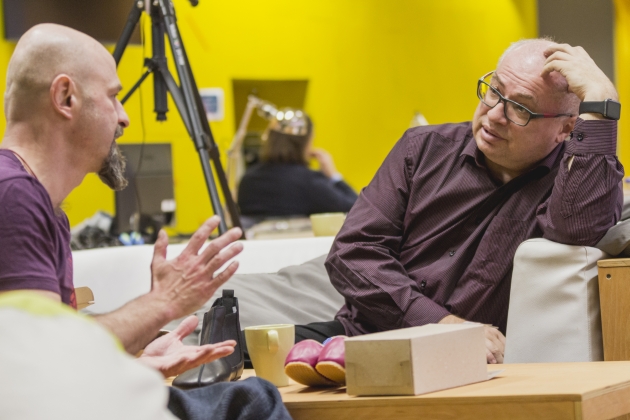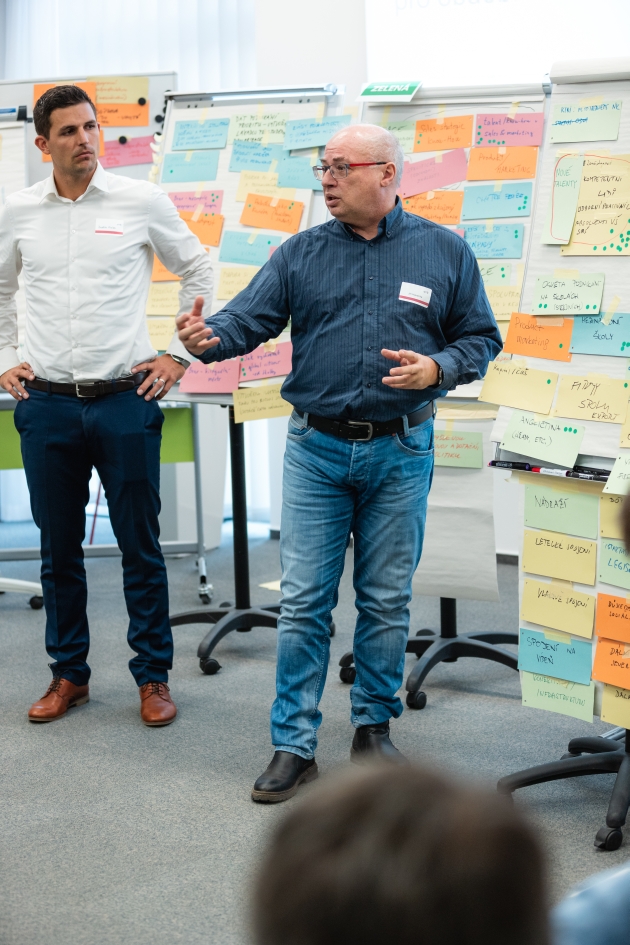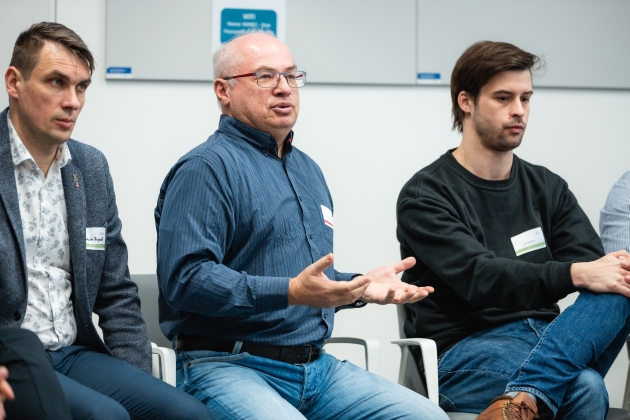Jiří Hlavenka: Born investor

The coronavirus crisis doesn't seem to be fading, I’m curious if there’s a reason to panic for new businessmen and start-ups now.
New businessmen? Not really – they are sort of outside the economy, with no big expenses and only a few employees, so they are in what we can call a protected mode. Their costs are minimal, since they use their own savings to start up their companies and sometimes still live with their parents or have obtained some money from investors. Paradoxically, they are better off now than regular companies that need to pay their expenses while their business collapses.
Do you think this crisis will affect the way investors behave? Will it make them look at different things with projects they’d like to invest into?
They’re going to be more careful, of course; investors are very often businessmen as well, and they normally get some revenue from their own companies and are able to put some money aside for investments. And right now this money put aside may be partially spent, companies may even incur financial losses, so they’ll use this money for themselves and take a break from investing. Also, the crisis – the one that is already here or the one that is only to come – will make all their clients poorer and business in general will get worse. In the last five years, things have been really easy and you didn’t have to do much to become successful. Now, however, people are going to save money, which will affect the way investors think as well. On the other hand, this crisis may not be the worst time to start up a company at all.
Which branches or products do you think have the best chance at drawing attention on the market right now?
To put it more generally, let’s not search for any “sexy” segments; right now, it may be an excellent plan to enter tourism, as people are going to start travelling again. The fact that we aren’t travelling now doesn’t mean we won’t be travelling in a year or two, either. I just don’t see a specific business this crisis could make collapse as a whole; nevertheless, it’ll always make sense to invest into branches where our physical world meets the world of technologies, such as building houses, food production – simply put, a thing which has always been here and always will be. Something people need and you only add a new technology to modify it. These, I think, are healthy businesses always in healthy demand. And it’ll always be like this, as people must eat, live somewhere, put on clothes, and travel.
“Just don’t panic!” Jiří Hlavenka
I hear a lot of new businessmen mention myths about investors and investing, such as “they give me too little – they give me a lot” or “I can’t get to them at all – I can’t get away from them”. What’s the biggest myth you’ve come across?
I know what you’re talking about and must say I’m sorry that people who’d like to do business don’t even know the most basic business rules. Even so, I wouldn’t really call them myths, as I prefer to say those who ask for investments are simply not fully prepared. They come up with an idea and then expect an investor to accept and finalize it, or even come work for their company as the CEO. “I have an idea, what do you say about it?” they say. And I say nothing. They are the ones who have to come up with a business plan, not just an idea. I’d say that this is the most frequent scenario.

What would you say the best phase is for a new businessman to come ask for an investment?
Ideally at the very beginning when no company has been established yet but with everything well-thought-out, with a team, market research, and ideally with a prototype. At the point where the actual business hasn’t started yet, and is only seeking funds to start the machine. All in all, a phase when they have more than just an idea in their heads. Don’t approach investors with just ideas – everyone has millions of those already.
Are there other red flags that you look for when talking to new businessmen asking for funding?
A plan and a founder, these are the two fundamental things everything else depends on. The business plan has to be convincing and the founder has to be talented at business. This talent is a multi-genre thing – a businessman has to have a lot of skills, especially when it comes to leading and driving people forward. They also need to be competent in lots of other areas, like human resources, managerial skills, business and marketing, and they have to know a lot about their product. This person can’t focus on just one thing – that’s not enough to handle such a role. The key is to be able to handle the unknown and face various challenges. To sum up, I sit up in my chair when I see a healthy plan and a healthy founder.
Are the Czechs still a nation of excellent engineers and poor salesmen?
Yes, I think so. People are product-oriented here. We can produce, we have ideas, but we kind of feel that business will take care of itself and won’t cost too much money. People think it’s enough to hire one or two sales representatives and that’s it. What they aren’t aware of is how difficult it is to actually sell products, especially today when people are basically satisfied and have everything they want. I’d say almost every plan underestimates the demands of actually doing business, and that’s their weak spot.
Jiří Hlavenka is a Czech businessman and investor in information technologies. Among other things, he’s an owner of Computer Press publishing house based in Brno as well as the first Czech online shop Vltava.cz. He’s also been a member of the board in CP Online and CP Books. In recent years, he has mainly dealt in investments (one of his best-known activities is his investment into Brno-based Kiwi.com), and he is a prolific writer on information technologies. He is active in politics and has been a South Moravian Regional Assembly member since 2006.
Your business experience dates back to the early 1990s. Do you apply this experience when dealing with the start-ups you’ve invested in? Do you actively work on making them successful?
What I try to pass on and the way I approach my investments is a synthesis of all the experience I gained while active at a number of companies. Most people expect an investor to bring a huge number of contacts, but I rarely do that. The start-up phase is about discussing business, not contacts, I think. It’s about strategies, tactics, human resources, individual segments ranging from the product to marketing and sales… Also, I try to help the new businessmen get used to what I call “challenging” by playing devil’s advocate. I pretend that I want to destroy their business and then see how they deal with that. This is very important, and I make a point to tell them not to get scared by how bad I will be, as that’s what needs to be done in order to reveal all the weak spots of your business plan and the ways to resolve them.

Do you have any special modus operandi for your investments? Anything typical for you?
There’s one thing I always implement everywhere – a reporting system. I always warn these people and tell them it’s a lot of work, really, but on the other hand I tell them that at Kiwi we had a turnover of several billion and still managed to do a one-page report, so they’ll handle it as well. And by reporting I mean the regular tables in a very brief and informative form. This is what I insist on. Another thing is boards: I want people to get used to holding at least quarterly board meetings. A board is a slightly more official meeting with an agenda and materials we’ll go through, like in a corporation. So boards and reporting are what I implement everywhere. The rest always depends and may be implemented ad hoc.
The boards are a big thing in the world of start-ups in the West and they’ve been catching on here slowly but surely. Do you think they make sense even in companies with no investors where the founders want to hold them only to see how they are doing?
Yes, I believe so. The Czech Republic reminds of a rabbit’s hole; we live here surrounded by the mountains, people don’t really see the bigger picture of what happens in the world… A good group of consultants comes in handy for every start-up, though. I would hold professional boards even in well-established companies, as is usual in the West.
What advice would you give to start-ups preparing to negotiate with investors? What to be aware of and what not to omit?
Very briefly: do not underestimate the contract you conclude with your first investor. It’s bad to not have a contract at all, but I sometimes see 40-page contracts, and that’s extreme as well. An experienced investor just can’t require a beginner to understand all those complex things related to investments or want them to pay for expensive lawyers. And they shouldn’t want the start-up guys to say to themselves “OK, I don’t understand it, but I don’t want to look like a fool, so I’ll just sign it.” That’s exactly how bad relationships are born.
I always try to keep the contracts I conclude with the start-ups simple and easy to understand, and I want them to understand what kind of protection I need as an investor. They need to understand that an investment isn’t a loan, and that the money now belongs to them, or to the company, in fact, and that they – as majority shareholders – decide what the company does. I, on the other hand, need some kind of protection. Actually, I say: “Look, I’m entering your business, and I want to have the right to leave as well.” And that’s what we need to agree on and make very clear in the contract.
What if a start-up owner meets with an investor who has never invested before and is doing it for the first time?
This doesn’t sound like an ideal situation, but there’s a first time for everything. A typical mistake beginning investors make is to get too involved in company management, especially if they are businessmen. Simply put, they tend to intervene too much. They think the company they’ve invested into sort of belongs to them, and try to control it all, not realizing this is a totally different type of relationship. However, an investor should mainly ask the right questions; they aren’t supposed to say “do this and don’t do that”. In such cases, they could really do the job themselves.

I understand that this requires quite a shift in mindset…
Yes, especially for “factory-owner” managers; they are used to controlling and checking every single thing, and every day they bark commands at those around them, over and over again. If they’re smart, though, they’ll quickly realize that investing is about something else completely.
Let’s finish this interview with Kiwi.com, a company often described as one of the best investments in Czech history. What’s the role of luck in investing?
Huge! Well, luck plays an essential role in business itself, too. Kiwi was a lucky bet for all those involved. I remember that during the first meetings it occurred to me that this could be a true niche market indeed. Only I had no idea – nobody did – that the niche was so huge. You never know how rich a gold mine will turn out to be. Or if it’s actually a gold mine at all. You have to trust your intuition because you can never know everything, and even when you know a lot, lots of your decisions are still about luck. You can only ever see a bit of the path ahead of you, and not any further. And when you reach a point you didn’t even see at the beginning of your journey, you can no longer go back and luck is what determines if you find the gold or a wasteland. I like to say that the connection between an investor and a founder is worse than marriage, because in marriage you can always get a divorce, but you can’t get a divorce in this relationship. Still, I must admit that I’ll be happy to keep entering these “worse than marriage” relationships in the future. I’m going to do this as long as I can. The way I see it, I’ll never get tired of investing.
A shortened version of the JIC TALK podcast in which Hanka Šudáková interviewed Jiří Hlavenka. Its complete version (only in Czech) is here.
Read more about the topic
This year’s Velvet Innovation Conference will bring together global leaders to discuss security in connection with artificial intelligence and the responsible development of technology. Among the keynote speakers will be Vijoy Pandey, Vice President at Cisco and head of Outshift, the company’s innovation studio in Silicon Valley that creates technologies for the world of tomorrow.
